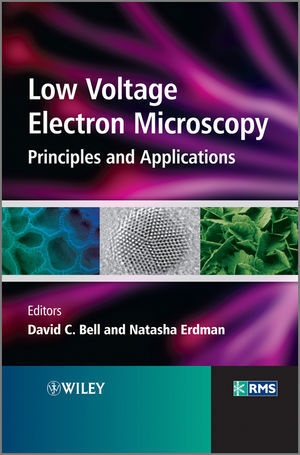Read more
Informationen zum Autor David C. Bell received his PhD in physics from the University of Melbourne, Australia in 1997 and completed his postdoctoral studies at MIT in 1999. He was research faculty and principal investigator at the University of Minnesota from 2000 to 2002. In 2003, he joined the Center for Nanoscale Systems at Harvard University as a principal scientist and became the Manager for Imaging and Analysis in 2007. He has been a lecturer in applied physics at Harvard since 2003 and is a teaching professor at the Harvard Extension School. In 2007, he was a visiting scientist at the Department of Materials, Oxford University, UK. Dr Bell is one of the renowned experts in the field of elemental analysis using electron microscopy (TEM and STEM) and has co-authored a book on this subject. He has authored more than 70 research papers on the subjects of microscopy, materials science and biology and holds several patents. He is an elected Fellow of the Royal Microscopical Society, UK. Natasha Erdman received her Ph.D. in Materials Science and Engineering from Northwestern University (Chicago, IL) in 2002. After completing her Ph.D. she worked as a Senior Research Chemist at UOP LLC (currently Honeywell) in Des Plaines, IL focusing on investigation of structure-properties relationship in various catalysts using electron microscopy techniques. In 2004 Dr. Erdman as joined JEOL USA Inc., and currently serves as an SEM and Ion-Beam Product Manager. She has authored over 30 peer-reviewed papers on the subjects of microscopy, materials science, chemistry and biology and is a renowned expert on ion-beam based sample preparation techniques for electron microscopy. Klappentext Part of the Wiley-Royal Microscopical Society Series, this book discusses the rapidly developing cutting-edge field of low-voltage microscopy, a field that has only recently emerged due to the rapid developments in the electron optics design and image processing.It serves as a guide for current and new microscopists and materials scientists who are active in the field of nanotechnology, and presents applications in nanotechnology and research of surface-related phenomena, allowing researches to observe materials as never before. Zusammenfassung Part of the Wiley-Royal Microscopical Society Series, this book discusses the rapidly developing cutting-edge field of low-voltage microscopy, a field that has only recently emerged due to the rapid developments in the electron optics design and image processing. Inhaltsverzeichnis List of Contributors ix Preface xi 1 Introduction to the Theory and Advantages of Low Voltage Electron Microscopy 1 David C. Bell and Natasha Erdman 1.1 Introduction 1 1.2 Historical Perspective 2 1.3 Beam Interaction with Specimen-Elastic and Inelastic Scattering 3 1.3.1 The Scattering Cross Section 6 1.3.2 Effects of Specimen Damage 10 1.4 Instrument Configuration 11 1.4.1 Scanning Electron Microscope 11 1.4.2 Transmission Electron Microscope 12 1.4.3 Scanning Transmission Electron Microscope 12 1.5 Influence of Electron Optics Aberrations at Low Voltages 12 1.5.1 Spherical Aberration 13 1.5.2 Effect of Chromatic Aberration 14 1.5.3 The Diffraction Limit 15 1.5.4 Optimizing Spot Size for SEM and STEM 15 1.6 SEM Imaging at Low Voltages 16 1.6.1 Primary Contrast Signals and their Detection in SEM 18 1.6.2 Backscattered Electrons 18 1.6.3 Secondary Electrons 21 1.6.4 Charge Balance in SEM 23 1.6.5 SEM Image Contrast 24 1.6.6 Microanalysis in SEM at Low Voltages 25 1.7 TEM/STEM Imaging and Analysis at Low Voltages 26 1.8 Conclusion 27 References 28 2 SEM Instrumentation Developments for Low kV Imaging and Microanalysis 31 Natasha Erdman and David C. Bell 2.1 Introd...

